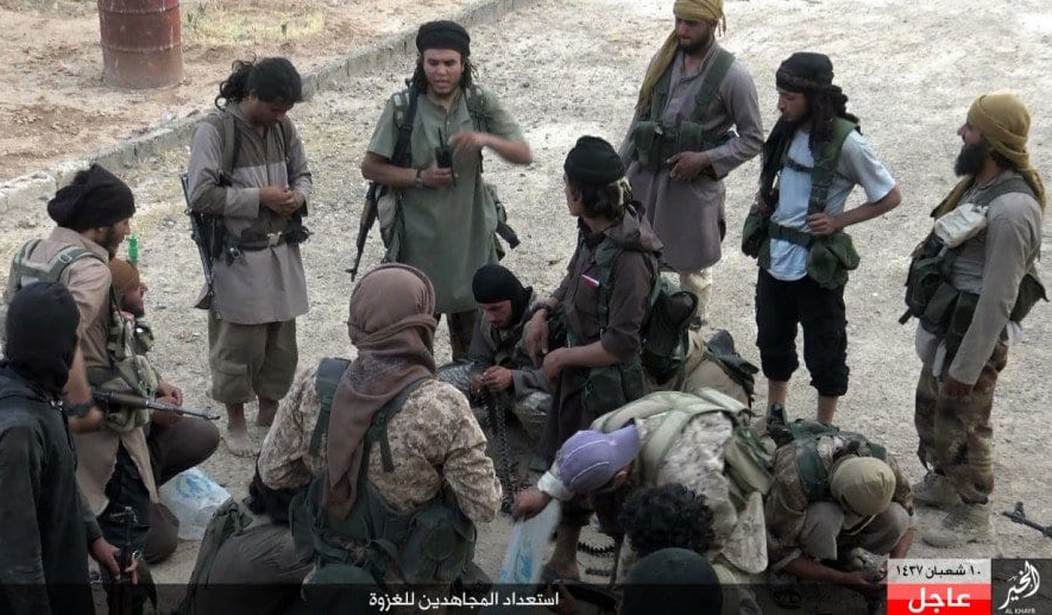ARLINGTON, Va. — An ISIS member involved in the use of chemical weapons was killed last week following the March capture of the group’s chemical weapons chief — but a spokesman for U.S. operations in Iraq suggested that there are more ISIS involved with the deadly concoctions who need to be found.
Speaking by video from Baghdad to reporters at the Pentagon today, Operation Inherent Resolve spokesman Col. Steve Warren announced “two high-value individuals” were killed in a May 13 operation.
Abu Hamza, a “mid-level military commander” and former al-Qaeda in Iraq member operating around Nasiriyah, “planned and conducted attacks against Americans during Operation Iraqi Freedom.”
“More recently, he has been responsible for coordinating ISIL fighters, reinforcements and finances in the Euphrates River Valley. Local fighters thought highly of him as a motivator and a leader,” Warren said. “Now he’s dead.”
“…They saw him as a cheerleader, right? That’s kind of how we referred to him, right? He was sort of a cheerleader for the local forces here. And he’s a cheerleader who will cheer no more because he’s dead.”
His “associate,” Abu Sufyan, was “responsible for staging chemical attacks in the Euphrates River Valley.”
Pressed on the nature of those attacks, Warren replied that “on the chem side, you know, this is a threat that we’re aware of and that we’ve taken into account.”
“We’ve certainly reported out that, I mean, it’s not new that this enemy has used chemical weapons. They killed three children in Taza with chemical weapons. They’ve conducted chem strikes along the Kurdish forward line of troops on several occasions,” he said. The March attack on Taza, an ethnic Turkmen town, consisted of some 40 rockets tipped with what was believed to be a mix of mustard gas and chlorine.
“So, you know, the enemy use of chem weapons is something that we’ve accounted for. And we understand, and you know, and this is why we conducted our operations to seize Abu Dawud, who was their chemical weapons emir.”
In an April speech at CIA headquarters offering a progress report on the fight against ISIS, President Obama mentioned Dawud’s March capture by coalition forces as a coup that was “giving us critical information that’s allowed us to unleash more strikes against those sites.”
Warren said the U.S. awareness of ISIS’ program is “why we conducted operations in Mosul to destroy their chemical weapons facility.”
“This is why we conducted a significant strike in Anbar province a month or so ago to destroy another one of their chemical weapons production facilities,” he said. “So this is a threat that we’re aware of. This is a threat that we’re accounting for. And this is a threat that we’re actively targeting.”
“This is why we were very happy that we killed Sufyan, because he’s, you know, associated with chemical weapons. And we’re going to continue doing it. If there is another Daesh operative out there watching and he’s involved with chemical weapons, he can rest assured that we are looking for him and that we’re coming after him.”
Warren said that Dawud, the chemical emir, is in Iraqi, not U.S., custody.
“We conducted an initial interrogation, turned him over to Iraqi forces for detention and disposition. And if we need — if we have a question that we think he’s got the answer to, we absolutely can pursue that, whether it’s in-person or you know, through our partners depending on the situation,” the spokesman said. “Sometimes, it’s as simple as asking the Iraqis, hey, go ask him this. Other times, we will want to do it in-person. There isn’t any — there is no hindrance there at all. We have access to that intelligence as we need it.”
Warren said the intelligence they reaped from interrogating Dawud “led to a number of strikes both against chem weapons specific — you know, specific chemical weapon targets and other targets.”
“He was their chemical weapons emir, but obviously he had an understanding of their logistics system, you know, the way they do business,” the colonel added. “So, you know, we were able to collect intelligence in areas other than chem-specific as well. So it was a good get.”








Join the conversation as a VIP Member